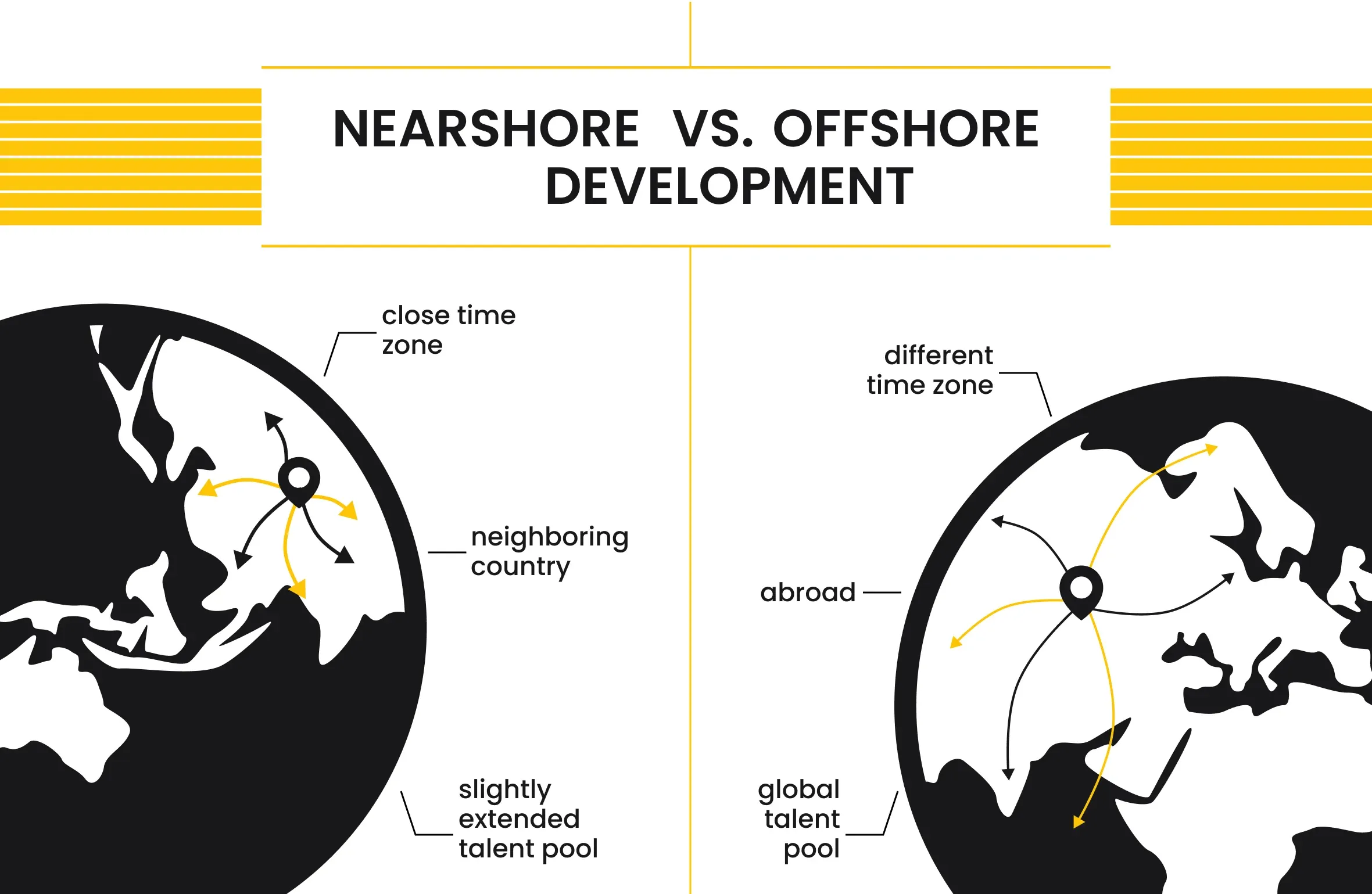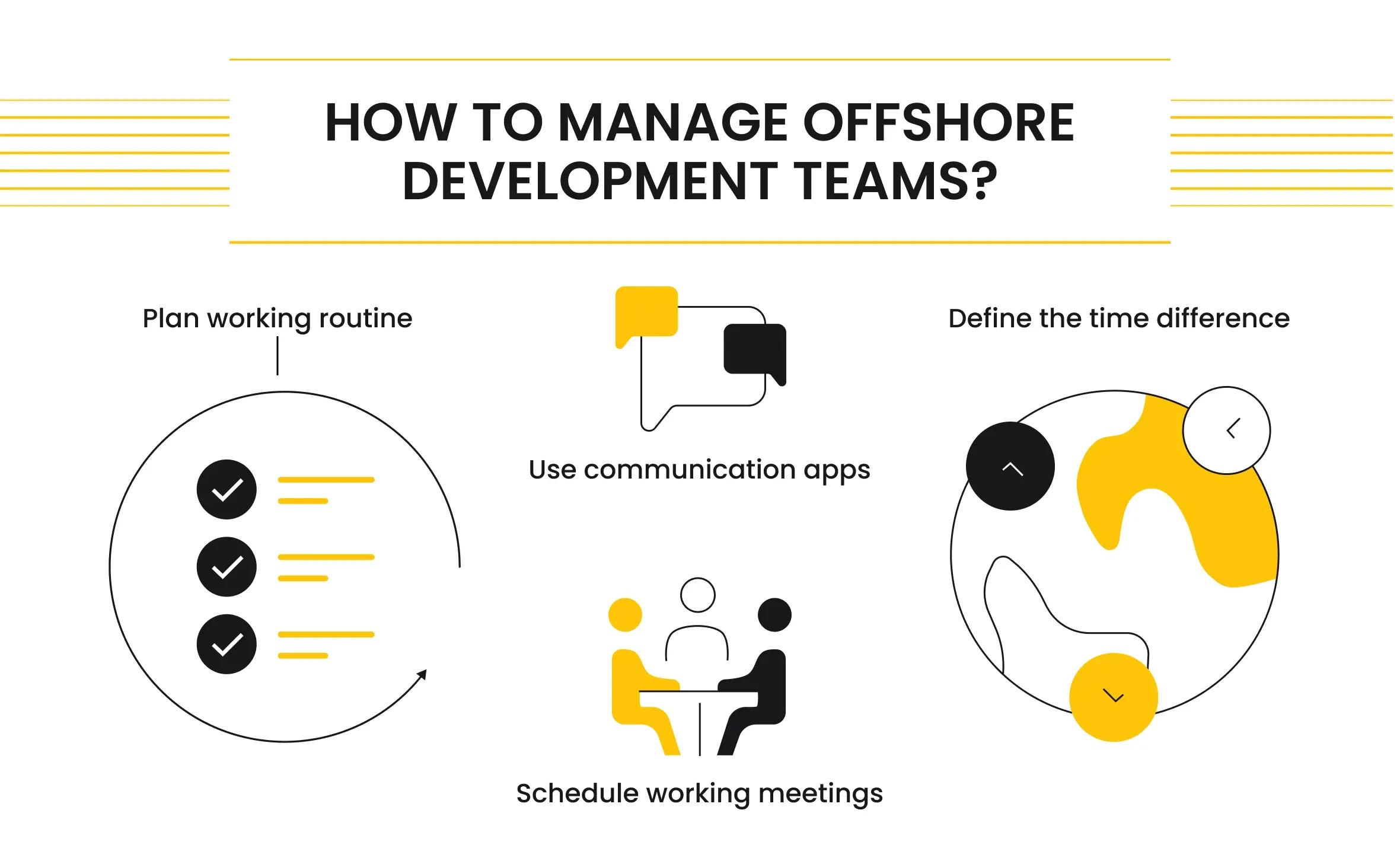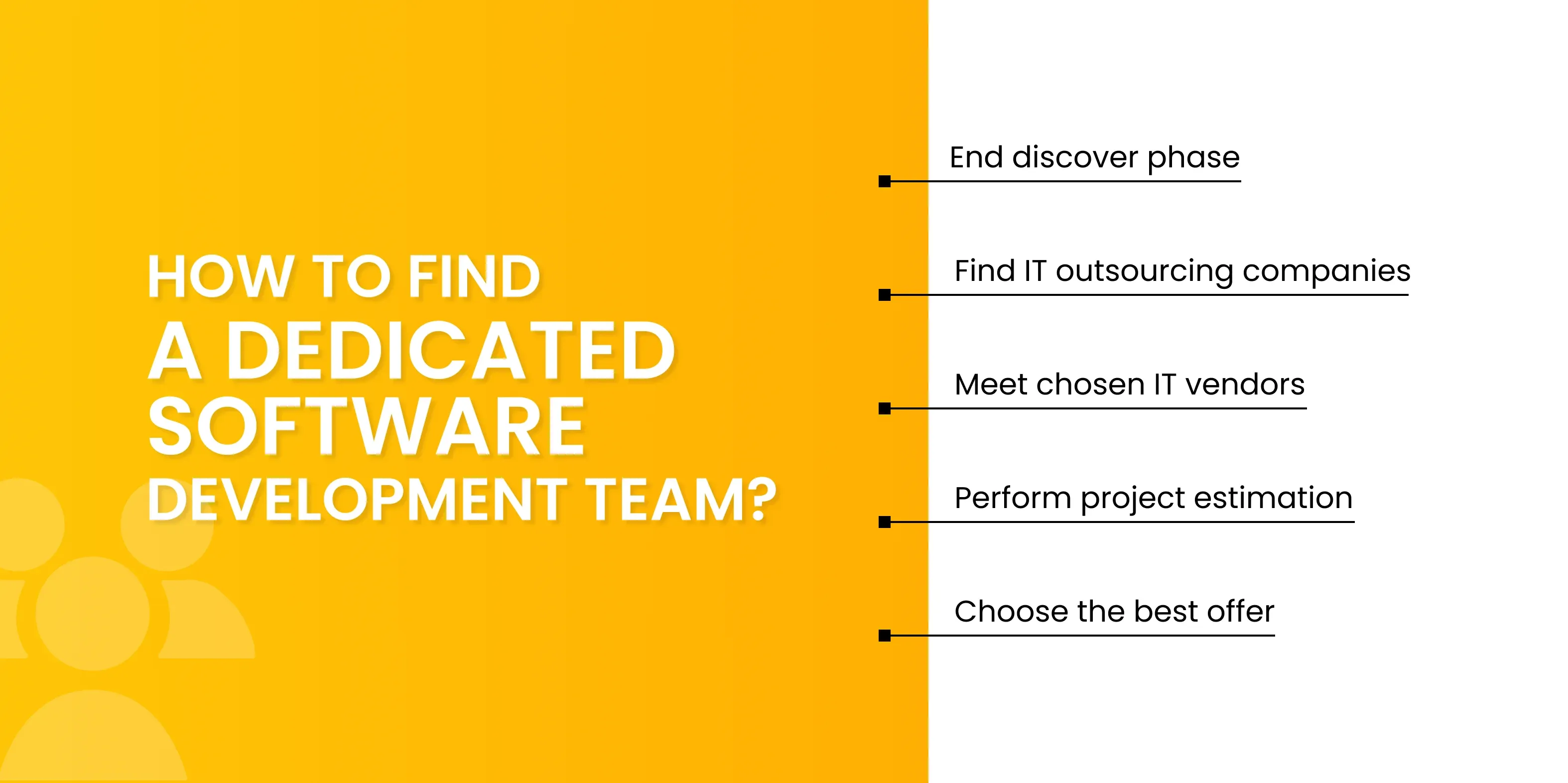Complete Guide To Hire Offshore Developers
May 03, 2023 • 827 Views • 15 min read
Bohdan Vasylkiv
CEO & Co-Founder
Hiring offshore developers has already become a widespread practice in the IT outsourcing and software development industry. Offshore application development seems to become an even more popular trend in the next few years.
Apart from knowing about the existence of services like remote software development teams, you also should learn the basic specifics of such development and cooperation approaches. Thus you can make a more informed choice and know how to hire offshore software developers, who will upscale your software development project.
Offshore Development Teams In A Nutshell
The offshore software development process is similar to IT outsourcing and hiring dedicated software development teams.
It is a process of finding remote app developers for hire, who can perform certain tasks, related to software development. The main difference between IT outsourcing and hiring offshore programmers is the location of developers:
- When you hire offshore dedicated developers, they are located overseas and in different time zones,
- When you choose IT outsourcing, you can choose nearshore vs offshore, based on what is more suited for you.
Both approaches to hiring developers for startup or white-label app development share almost the same advantages and drawbacks. It is possible to notice only a few differences, by comparing nearshore vs offshore IT outsourcing.

For instance, nearshore outsourcing simplifies software development management by ignoring the time zone difference and cultural specifics. Additionally, nearshore outsourcing is a great way to hire remote software development teams or developers. Access to a bigger talent pool is a great advantage, especially when the number of app developers for hire is limited in your region.
Hiring offshore software development teams offers an even larger talent pool and helps to significantly cut expenses by outsourcing software development to Eastern Europe or similar offshore destinations. Remote software development teams from popular IT outsourcing hubs are cheaper to hire, yet show impressive performance and quality results in terms of software development. Yet, you will have to face the time zone difference and adjust the schedules of in-house and remote teams.
To sum up, offshore application development is an IT outsourcing approach, when you hire offshore programmers, located in overseas countries with different time zones and cultures.
The two most commonly asked questions about offshore development teams are: “How to manage an offshore development team?” and “How to hire offshore software developers?”
How to Manage an Offshore Development Team?

The process of offshore development team management is quite similar to managing an in-house team. Most team management and communication tools and project management software are similar in both scenarios.
The only difference is reaching your developers. You always can meet in-house developers physically and easily track their progress. Alternatively, when you hire offshore programmers, contacting even a single developer might be a very tough task. Apart from communication skills and language barrier, you will face time zone differences and cultural specifics.
Still, even such issues have solutions, so communication with offshore developers from another part of the globe is usually delegated to the project manager, who acts as an intermediary between both sides.
Another important aspect is to ensure communication and collaboration with a remote development team. One of the solutions is using a wide range of software applications for remote team communication and project management like Slack, Jira, Notion, etc.
How To Hire Offshore Software Developers
Offshore development team management is quite an obvious and typical practice, which has a lot in common with the best project team tracking and managing practices.
Hiring offshore software development teams, on the other hand, is a complex and variable process. It is not the same as hiring developers for a startup or gathering an in-house team. It requires a lot to understand and clarify, before starting the hiring process and interviewing developers.
How Does Offshore Application Development Differ

First things first, the difference lies in the offshore software development models. For instance, usually, there are three central cooperation agreements:
- Fixed Price Agreement
- Time and Materials Contract
- Dedicated Team Approach
The main difference between time and materials vs fixed price agreements is the conditions on which the development takes place.
The fixed price contract means that the spending is discussed before the development starts, and both sides agree on the terms and scale of work to be done, as well as the final price of the performed tasks.
As a result, the working routine, as well as the list of features to develop are predefined. In case there is extra work to do and you need to make adjustments to the software project development plan, both sides should sign a new or supplemental agreement. It also includes additional scale and price estimation. So, a fixed-price agreement is a great choice, when you need to hire offshore dedicated developers for a limited number of simple tasks.
The time and materials agreement is the complete opposite of the foregoing: the scale and price of work are not fixed, and the development team is paid monthly for the developed functionality or features. This is a great solution for developing scalable and complex projects or a preferable approach when it comes to outsourced development from scratch.
Contrary to the rest, hiring dedicated software development teams is about having a full-fledged team, similar to the in-house developers, yet the difference is that your dedicated team is located elsewhere except for on-premises. To rephrase it, a dedicated team is about having a team of remote developers, who will meet all software engineer requirements, and be working for you as regular developers, who are simply located in another country or region.
So, before hiring offshore developers, it is important to figure out what exact collaboration type you are looking for. After you do so, you can proceed to the next stage - interviewing app developers for hire.
Interview Questions to Hire Offshore Developer
There are two possible conditions on how to start this stage:
- You have a software project in progress. Therefore, you already know the technology stack, used in your development, and other technical aspects. So, you are hiring offshore developers for some specific purposes and features.
- You are considering the offshore development team as the main working team, which will be developing your software project from scratch.
In the first case, you are looking for certain app developers for hire, familiar with the technologies, you are using. The second scenario foresees more flexible conditions, like hiring developers for startups, and then consulting with them about the possible technologies to use.
Apart from offering development teams as a service, most IT outsourcing companies also have broader access to various software solutions and experience in using them. Thus, sometimes it is preferable to look for an experienced offshore software development team to create an app from scratch. It allows using alternative software development instruments.
Regardless of the collaboration approach, you will have to ensure that your software requirements specifications, and business goals are met by the hired offshore developer. To do so, you have to interview and assign a test task to the potential employee. For instance, you might find useful some tips on hiring a perfect React developer for a startup, in case you are looking for team extension services.
Alternatively, there are plenty of guides on how to hire a Python developer. Despite that most questions and interviewing methods are similar, each technology still requires an individual approach and a list of technology-specific questions and tasks due to the software solutions difference.
This is a must-have routine even when you want to hire offshore developers or cooperate with IT vendors, who are proposing development services. For a better illustration, we propose to examine some examples of such cooperation with offshore partners and peek at what it looks like in certain cases.
How To Hire Offshore Software Developers With Incora

Incora is an offshore software development company with proven experience in working with different technologies, starting with Frontend, and ending up with DevOps, or various cloud services.
For instance, we propose hiring remote dedicated software development teams and software development team extension services, depending on your request. Most of our offshore developers are niche-experienced. This means, that they have more expertise in specific industries like Blockchain, eCommerce, Logistics, and many others. So, onboarding a niche-experienced developer gives you an advantage over the potential competitors thanks to extensive knowledge-sharing and field expertise:
a developer, who is aware of potential issues or limitations of a specific industry, as well as possible solutions to the occurred issues is a great addition to any software development project.
When it comes to direct collaboration, there are two possible approaches, depending on what the client needs:
- If it is a dedicated development team, then we estimate the overall scale of work, as well as the required list of technologies. Then, we select the offshore development team, which mainly consists of 5 people: two developers for each -end, a project manager, a quality assistant, and a DevOps specialist. Alternatively, each team can be extended on-demand, in case the project is too scalable or complex.
- When it comes to software team extension, we simply propose a list of the most suited developers for the software engineer requirements from the business owner. Then, clients usually perform interviews with each candidate to choose the right one.
Additionally, to help our potential clients to better understand our experience we always encourage them to check our case studies and ask any questions by contacting us directly.
What’s your impression after reading this?
Love it!
1
Valuable
1
Exciting
1
Unsatisfied
1
FAQ
Let us address your doubts and clarify key points from the article for better understanding.
Why would a company consider offshore hiring of software engineers?
Offshore hiring can be an effective way for companies to expand their talent pool and reduce costs. By outsourcing to countries where labor is cheaper, companies can often find highly skilled engineers at a lower cost than hiring locally.
What are the challenges of offshore hiring of software engineers?
The main challenges of offshore hiring include communication barriers, cultural differences, and the difficulty of managing remote teams. It can also be challenging to find the right talent and ensure that they have the necessary skills and experience.
What steps should a company take when hiring offshore software engineers?
The first step is to define your requirements and create a clear job description. It's important to conduct thorough research to find reputable outsourcing companies or remote teams. When you've narrowed down your list, you should conduct interviews and technical assessments to evaluate the candidates' skills and experience. You should also create clear guidelines and processes for communication and project management.
What are some best practices for managing offshore software engineers?
To effectively manage offshore software engineers, you should establish clear lines of communication, set expectations for deliverables and timelines, and use collaboration tools to stay organized. You should also schedule regular check-ins to ensure that the project is on track and that any issues are addressed promptly.
What are some common mistakes to avoid when hiring offshore software engineers?
Some common mistakes include failing to properly vet outsourcing companies or remote teams, failing to establish clear communication and project management processes, and failing to set realistic expectations for deliverables and timelines. It's also important to avoid micromanaging and to establish a culture of trust and collaboration with your offshore team.
you may also like
Let's talk!
This site uses cookies to improve your user experience. Read our Privacy Policy
Accept
Share this article